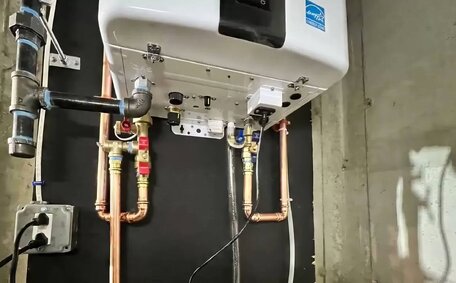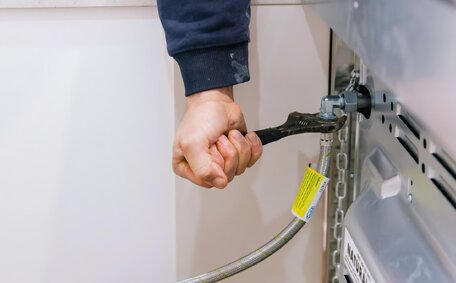Determining Tankless Water Heater Suitability for Large Families
For large families, it’s crucial to gauge peak hot water usage to determine if a tankless heater suits their demand. Consider the count of bathrooms, household size, laundry frequency, and concurrent activities such as several showers. Factor in lifestyle-related hot water needs, such as the lengthy showers often favoured by teenagers.
Estimate the flow rate in litres per minute needed during peak times to determine the capacity required for a tankless system.
Allow for around 2 gallons per minute per standard showerhead to align with your needs, whether you opt for tankless or traditional gas storage water systems. A 4-bathroom, 7-person household may require a system that delivers at least 53-80 litres per minute.
Additionally, factor in a safety margin of 20-25% more capacity for any future increase in your hot water needs. Selecting multiple gas tankless units or one expansive system ensures sufficient flow rates for the demands of a large household.
Continuous Hot Water Supply Benefits
The advantage of continuous flow is that it ensures multiple people can access instantaneous hot water simultaneously, so there’s no chance of running out of hot water for larger families with high demand. Tankless systems provide high flow rates - often over 5 gallons per minute - ensuring every family member can enjoy instant hot water for showers, laundry, and other needs simultaneously without depletion.
The versatile heating air system not only provides comfort but also ensures you won’t run out of hot water, allowing for showers at the same time without shortages by warming water for various uses. Parents can shower early with consistent water temperature, while the kids can sleep in, assured there’s enough hot water left for cooking or cleaning later.
Tankless heaters offer instantaneous ability and efficiently heats water on-demand, unlike tanks that hold a limited volume. This boundless capacity, not needing to store hot water, coupled with precise water temperature control, ensures there’s no worry about availability.
Energy Savings from Tankless Systems
Pairing tankless systems with solar hot water options can lead to notable energy savings, particularly in households with moderate usage. By only heating water on demand, these energy-efficient units surpass the efficiency of standard models and help reduce energy bills without the constant temperature upkeep.
For low-use households, there’s no doubt that tankless hot water heaters with heat pump technology can save on water heating system costs where less water can be heated more efficiently. Savings come from not constantly reheating a tank of unused tank water. Heat loss from storage also requires more energy expenditure over time.
Energy efficiency in high-condensing gas water heaters, including electric hot water units as well, enhances energy savings by utilising heat from exhaust gases and minimising storage tank water heaters heat loss. This advanced strategy makes tank storage seem outdated, boosting efficiency beyond 90% and slashing natural gas or electricity use in various household settings.
Although tankless water systems consume more energy while operating compared to tank heaters, the absence of standby losses often offsets this in homes with lower usage. Parameters like climate, insulation, and hot water demand patterns impact savings.
While tankless options may offer smaller savings for families with substantial water needs, they tend to be more energy efficient than large storage tanks. Precision temperature control in a water heater can further optimise energy use.
Installation Considerations for Tankless Units
Careful planning is vital when installing a tankless unit due to specific ventilation and electrical requirements. Consult a professional to assess whether your tankless water heater meets the need, or do need adapting, of your current water setup.
The compact tankless water heater can fit neatly in areas as restricted as a few square feet, such as closets and small alcoves, providing on-demand hot water without running out. Their slender design occupies less room than conventional units. This flexible placement helps maximise layout options and optimise your energy usage.
In contrast to storage tank water systems, most tankless models require upgraded electrical capacity and new venting. Entire-home systems generally need an electrical service between 150-200 amps for their high-output heaters. New exhaust vents are also required to handle increased moisture.
Wondering more about the energy efficient pros and cons of tankless water systems, including installation costs? Costs for installing storage systems span from approximately $2,000 to $5,000, including essential components. Evaluate the pros cons tankless water systems may have by weighing the investment against potential energy savings and reduced standby losses over time compared to traditional tanks. Professional expertise is recommended to ensure the storage hot water heater your household chooses is implemented flawlessly.
Maintenance Needs and Operational Life Span
One advantage of tankless over storage hot water systems is their extended operational lifespan, usually surpassing 20 years versus 10-15 years for traditional tank water heaters. This long lifespan relies on adhering to a diligent maintenance routine, contrary to electric storage water systems.
Routine annual maintenance by specialists ensures consistent hot water supply and performance, irrespective of the cold water quality. Tasks involve descaling heat exchangers and checking components like pumps, valves and electronics. Flushing the heat exchanger within the system prevents mineral buildup.
The compact, sealed nature of tankless heaters means limited servicing needs. However, maintenance and operation costs are influenced by water quality; regions with hard water necessitate more regular descaling. Operating costs are low, around $150 yearly for inspection and descaling.
Tankless water heaters often offer greater lifetime value, thanks to their extended lifespan with regular maintenance, despite higher initial costs. Proper care of these units assures uninterrupted, dependable service and protects your investment in an efficient setup.
Customizing the System to Meet Family Demand
Choosing a suitable hot water heater, especially a tankless one for a large family, requires tailoring the system to your home’s specific requirements. Consider your peak usage times to determine when you’ll need hot water the most - when are showers, laundry and dishes concentrated? How many bathrooms or residents are using hot water simultaneously?
Select the size tankless water heater that can cater to your calculated peak demand, and you’ll want to consider the potential for future growth as well. Multiple linked tankless heaters may suit households needing over 8-10 gallons per minute. Going too small risks depletion during high-use mornings or evenings.
Higher temperature rise capacities also help meet high flow rates. Seek whole home systems with temperature rises between 75-100°F. And consider energy factors - higher efficiency condensing models maximise savings during continual operation.
Collaborate with experts to make sure the water heater your home adopts fits your lifestyle patterns and water usage habits. Customising tankless heater size, flow rates and energy features ensures continuity of supply even for large, busy families.
Professional Consultation for Optimal System Sizing
For proper sizing of a tankless system in a big household, we strongly recommend consulting experts such as Minchinbury Plumbing.
Our expert knowledge vouches for precise heater recommendations, ensuring a consistent and hot water supply, even during peak use. We factor in considerations like the number of residents, bathrooms, simultaneous uses, flow rate needs and more to right-size the system.
Too small a system can result in shortages, a usual worry regarding tankless water heaters. But choosing the right size can help maximise potential energy savings. Our proficient analysis of your distinct requirements guarantees on-demand access to hot water, with adequately sized models for optimal efficiency.
We’ll assist you in selecting a system from reputable brands that fulfils your hot water requirements within your budget. And provide advice on potential electrical upgrades, venting needs and ideal installation locations tailored to your home.
Rather than guessing, have our experts precisely determine the water heater size needed for a consistent household supply. Our professional consultations guarantee the capacity of your system to consistently supply hot water now and onwards.






